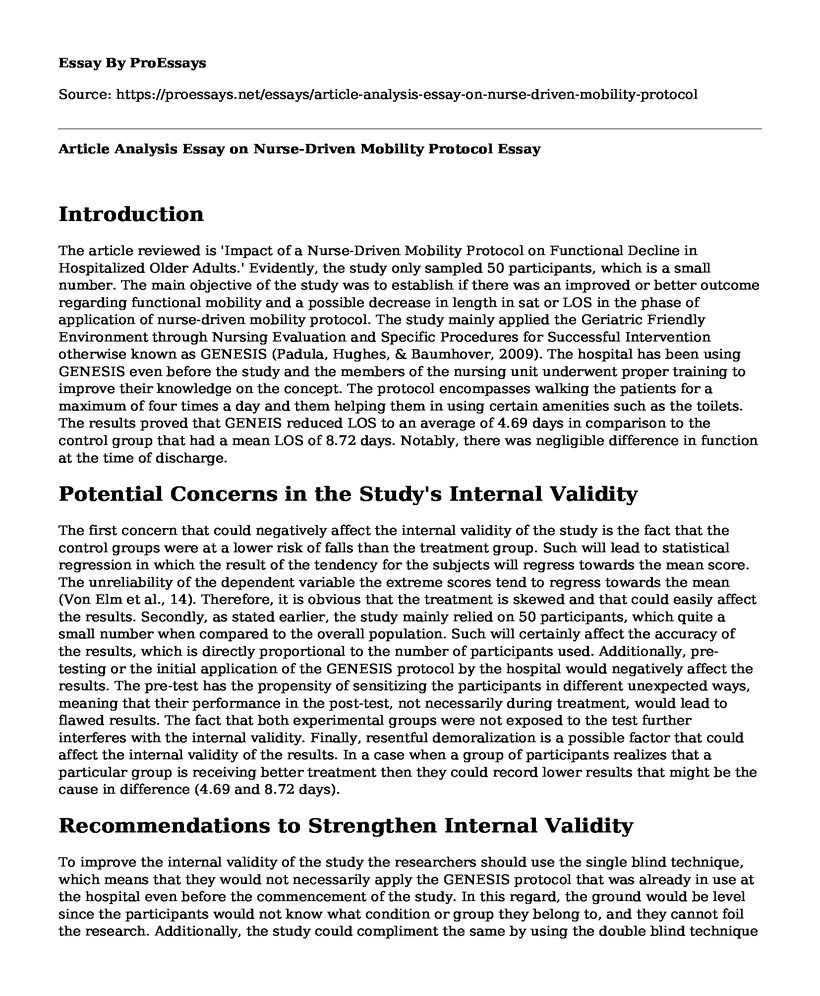Introduction
The article reviewed is 'Impact of a Nurse-Driven Mobility Protocol on Functional Decline in Hospitalized Older Adults.' Evidently, the study only sampled 50 participants, which is a small number. The main objective of the study was to establish if there was an improved or better outcome regarding functional mobility and a possible decrease in length in sat or LOS in the phase of application of nurse-driven mobility protocol. The study mainly applied the Geriatric Friendly Environment through Nursing Evaluation and Specific Procedures for Successful Intervention otherwise known as GENESIS (Padula, Hughes, & Baumhover, 2009). The hospital has been using GENESIS even before the study and the members of the nursing unit underwent proper training to improve their knowledge on the concept. The protocol encompasses walking the patients for a maximum of four times a day and them helping them in using certain amenities such as the toilets. The results proved that GENEIS reduced LOS to an average of 4.69 days in comparison to the control group that had a mean LOS of 8.72 days. Notably, there was negligible difference in function at the time of discharge.
Potential Concerns in the Study's Internal Validity
The first concern that could negatively affect the internal validity of the study is the fact that the control groups were at a lower risk of falls than the treatment group. Such will lead to statistical regression in which the result of the tendency for the subjects will regress towards the mean score. The unreliability of the dependent variable the extreme scores tend to regress towards the mean (Von Elm et al., 14). Therefore, it is obvious that the treatment is skewed and that could easily affect the results. Secondly, as stated earlier, the study mainly relied on 50 participants, which quite a small number when compared to the overall population. Such will certainly affect the accuracy of the results, which is directly proportional to the number of participants used. Additionally, pre-testing or the initial application of the GENESIS protocol by the hospital would negatively affect the results. The pre-test has the propensity of sensitizing the participants in different unexpected ways, meaning that their performance in the post-test, not necessarily during treatment, would lead to flawed results. The fact that both experimental groups were not exposed to the test further interferes with the internal validity. Finally, resentful demoralization is a possible factor that could affect the internal validity of the results. In a case when a group of participants realizes that a particular group is receiving better treatment then they could record lower results that might be the cause in difference (4.69 and 8.72 days).
Recommendations to Strengthen Internal Validity
To improve the internal validity of the study the researchers should use the single blind technique, which means that they would not necessarily apply the GENESIS protocol that was already in use at the hospital even before the commencement of the study. In this regard, the ground would be level since the participants would not know what condition or group they belong to, and they cannot foil the research. Additionally, the study could compliment the same by using the double blind technique to eradicate both the experimenter and characteristics bias (Burns et al., 2014). Towards this end, both the participants and the experimenter will not know group or conditions assigned to them. Finally, improving or increasing the number of participants from 50 to may 200 will provide results that are more accurate.
Dangers of Failing to Consider the Validity of a Research Study
It is imperative to note that researchers may skew the results of their studies. Validation guards against false results and bias that may lead to unhealthy practices, particularly in a sensitive field as that of nursing. Therefore, a strong validity is essential in creating and maintains evidence based practice (Berger, 2015). Without the application of sufficient evidence, there would not be the use of safety interventions in the nursing practice. The lack of generalization or validation of a study would lead to an apparent lack of effectiveness and efficiency in practice.
References
Berger, R. (2015). Now I see it, now I don't: Researcher's position and reflexivity in qualitative research. Qualitative research, 15(2), 219-234.
Burns, C. J., Wright, J. M., Pierson, J. B., Bateson, T. F., Burstyn, I., Goldstein, D. A. & Schnatter, A. R. (2014). Evaluating uncertainty to strengthen epidemiologic data for use in human health risk assessments. Environmental health perspectives, 122(11), 1160.
Padula, C. A., Hughes, C., & Baumhover, L. (2009). Impact of a Nurse-Driven Mobility Protocol on Functional Decline in Hospitalized Older Adults. Journal of Nursing Care Quality, 24(4), 325-331
Von Elm, E., Altman, D. G., Egger, M., Pocock, S. J., Gotzsche, P. C., Vandenbroucke, J. P., & Strobe Initiative. (2014). The Strengthening the Reporting of Observational Studies in Epidemiology (STROBE) Statement: guidelines for reporting observational studies. International Journal of Surgery, 12(12), 1495-1499.
Cite this page
Article Analysis Essay on Nurse-Driven Mobility Protocol. (2022, Nov 19). Retrieved from https://proessays.net/essays/article-analysis-essay-on-nurse-driven-mobility-protocol
If you are the original author of this essay and no longer wish to have it published on the ProEssays website, please click below to request its removal:
- Assignments on Epidemiology and Healthcare Reflection Professions
- Development of New Drugs for Multiple Sclerosis Therapy in Patients With Walking Disability
- Care Management in Nursing Practice Paper Example
- Essay Sample on Hospital-Acquired Infections
- Essay Example on Neighborhood Fierceness Impacts Illness Control & Investigation
- Essay Example on Global Crisis: The Unending Battle Against Disease
- Toolkit for Improving Patient Safety: 12 Essential Resources - Annotated Bibliography Example







